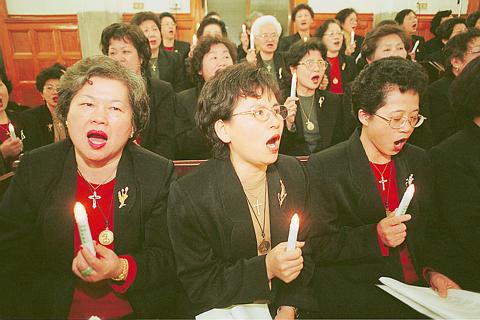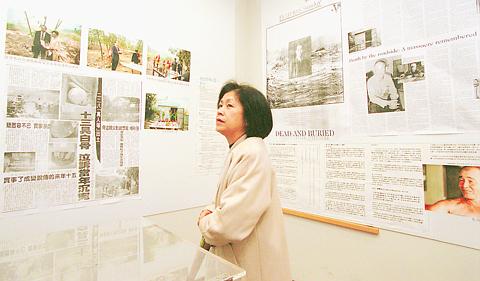Fifty-three years on, the events surrounding the 228 Incident of February 1947 still poison Taiwan's ethnic harmony.
The clash was primarily between mainlanders coming across from China in the aftermath of WWII and Taiwanese, whose ancestors had settled in Taiwan during earlier waves of migration.
A museum has been built as have memorials all over the island to commemorate the people who were killed or went missing during the violence of the events, but reconciliation still proves elusive.

PHOTO: GEORGE TSORNG AND CHIANG YING-YING, TAIPEI TIMESN
"If the public and the government see the 228 Incident as only a commemoration rather than as a starting point for the review of Taiwan's history, we will never learn the lessons [the event has to teach]," said National Taiwan University (NTU) historian Li Yung-chih (李永熾).
Facing up to history
Files referring to the 228 Incident were not released by the government until 1993 when the first official report -- A Research Report on 228 Incident (二二八事件研究報告), written by five historians -- was issued.

Some historians said that the report, which outlined the events that took place, was just the beginning.
"In terms of history, I don't think the government review was sufficiently careful," said Li, adding that a sense of "right and wrong" and the lessons the event might teach future generations were missing in the document.
However, the authors of the official report believe that the moral dimension is superfluous, saying that people make progress by learning from their mistakes.
"Since the government has apologized to victims' families, the priority for us now should be to eliminate the misunderstanding left by the tragedy between the two groups -- mainlanders and Taiwanese," said Huang Fu-san (黃富三), historian from the Academia Sinica and co-author of the official report.
Mutual suspicion
Huang said that the 228 Incident could be attributed to the different living standards in China and Taiwan at the time.
"Taiwanese were disappointed by the undisciplined and lawless troops from China," said Huang, adding that Taiwanese had by then been schooled in honesty and civic virtue by the Japanese colonial government.
Huang said that the two groups, mainlanders and Taiwanese, had been inadvertantly hurting each other's interests when the 228 Incident burst out in 1947, and the military repression that followed resulted in more misunderstanding and conflict.
"Mainlanders had access to more resources because [government] policies favored them," said Huang. "This established the superiority of the migrant mainlanders over Taiwanese."
Huang said that it was understandable that some Taiwanese held a grudge against mainlanders.
"The loss of many key [government] files, such as those relating to the many intellectuals killed during the 228 Incident, has resulted in a strong distrust of both the government and mainlanders," Huang said.
Some historians say the mutual suspicion that exists between the two ethnic groups has become an obstacle to consensus on Taiwan's identity -- whether it should be an independent country or just a part of China -- and this has not helped harmony among groups living in Taiwan.
"When mainlanders, who feel insecure, don't trust Lee Teng-hui (李登輝) because of his Taiwanese background, some Taiwanese advocate Taiwan independence based on memories left by the 228 Incident and later the White Terror (白色恐怖, a witch-hunt for political dissidents)," said Huang.
Honest history
Some historians suggest that uncovering and facing up to the facts of history is the only way out.
"Since the government, society and the media, have never had a clear interpretation of precisely what the White Terror was, the real face of history was hidden for decades," said NTU historian Li.
"Nowadays every political figure, when under pressure from others, always claims that he or she is a victim of `political persecution,' but this is nonsense," Li said, adding that the countless victims of political persecution were arrested without evidence and sentenced secretly after the 228 Incident.
"It's ironic that James Soong (宋楚瑜, an independent presidential candidate), who claimed that telephone lines at his campaign centers were wire-tapped, called himself a victim of the White Terror, Li said, adding that the White Terror created an atmosphere of fear.
"Ubiquitous monitoring networks setup by intelligence units confined people both spiritually and physically, and made them fear to say a word about politics," Li said.
Giving Taiwan priority
Li suggested that textbooks have to be revised to provide future generations with a deeper understanding of Taiwan's history.
"If the government could face the history, with all its right and wrong decisions and tell our children the truth, then future generations living on the island would not feel so confused," Li said, adding that Taiwan should be given priority over China in this process.
Historian Huang from the Academia Sinica agrees with Li, saying that stressing the history of Taiwan in textbooks would adjust long-term aberrations in Taiwan's history education.
"The differences among groups in Taiwan could push progress forward as long as all groups, mainlanders, Taiwanese, Hakka people and Aborigines all identify themselves as an important part of this land," Huang said. "Every group should be confident that its existence in Taiwan is a positive factor."

Nvidia Corp yesterday unveiled its new high-speed interconnect technology, NVLink Fusion, with Taiwanese application-specific IC (ASIC) designers Alchip Technologies Ltd (世芯) and MediaTek Inc (聯發科) among the first to adopt the technology to help build semi-custom artificial intelligence (AI) infrastructure for hyperscalers. Nvidia has opened its technology to outside users, as hyperscalers and cloud service providers are building their own cost-effective AI chips, or accelerators, used in AI servers by leveraging ASIC firms’ designing capabilities to reduce their dependence on Nvidia. Previously, NVLink technology was only available for Nvidia’s own AI platform. “NVLink Fusion opens Nvidia’s AI platform and rich ecosystem for

WARNING: From Jan. 1 last year to the end of last month, 89 Taiwanese have gone missing or been detained in China, the MAC said, urging people to carefully consider travel to China Lax enforcement had made virtually moot regulations banning civil servants from making unauthorized visits to China, the Control Yuan said yesterday. Several agencies allowed personnel to travel to China after they submitted explanations for the trip written using artificial intelligence or provided no reason at all, the Control Yuan said in a statement, following an investigation headed by Control Yuan member Lin Wen-cheng (林文程). The probe identified 318 civil servants who traveled to China without permission in the past 10 years, but the true number could be close to 1,000, the Control Yuan said. The public employees investigated were not engaged in national

ALL TOGETHER: Only by including Taiwan can the WHA fully exemplify its commitment to ‘One World for Health,’ the representative offices of eight nations in Taiwan said The representative offices in Taiwan of eight nations yesterday issued a joint statement reiterating their support for Taiwan’s meaningful engagement with the WHO and for Taipei’s participation as an observer at the World Health Assembly (WHA). The joint statement came as Taiwan has not received an invitation to this year’s WHA, which started yesterday and runs until Tuesday next week. This year’s meeting of the decisionmaking body of the WHO in Geneva, Switzerland, would be the ninth consecutive year Taiwan has been excluded. The eight offices, which reaffirmed their support for Taiwan, are the British Office Taipei, the Australian Office Taipei, the

CAUSE AND EFFECT: China’s policies prompted the US to increase its presence in the Indo-Pacific, and Beijing should consider if this outcome is in its best interests, Lai said China has been escalating its military and political pressure on Taiwan for many years, but should reflect on this strategy and think about what is really in its best interest, President William Lai (賴清德) said. Lai made the remark in a YouTube interview with Mindi World News that was broadcast on Saturday, ahead of the first anniversary of his presidential inauguration tomorrow. The US has clearly stated that China is its biggest challenge and threat, with US President Donald Trump and US Secretary of Defense Pete Hegseth repeatedly saying that the US should increase its forces in the Indo-Pacific region